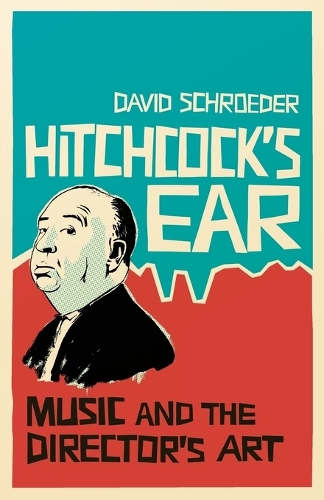
Hitchcock's Ear: Music and the Director's Art
(Paperback)
Available Formats
Publishing Details
Hitchcock's Ear: Music and the Director's Art
By (Author) David Schroeder
Continuum Publishing Corporation
Continuum Publishing Corporation
24th May 2012
United States
Classifications
Professional and Scholarly
Non Fiction
Music: styles and genres
Music of film and stage
791.430233092
Physical Properties
Paperback
280
Width 138mm, Height 216mm
356g
Description
Music is an underexplored dimension in Hitchcock's works. Taking a different view from most works on Hitchcock, David Schroeder focuses on how an expanded definition of music influences Hitchcock's conception of cinema. The structure and rhythm of his films is an important addition to the critical literature on Hitchcock and our understanding of his films and approach to filmmaking.
Alfred Hitchcock liked to describe his work as a director in musical terms; for some of his films, it appears that he started with an underlying musical conception, and transformed that sense of music into visual images. The director's favorite scenes lacked dialogue, and they made their impact through a combination of non-verbal actions and music. For example, the waltz and the piano are used as powerful images in silent films, and this approach carries over into sound films. Looking at such films as Vertigo, Rear Window, and Shadow of a Doubt, Schroeder provides a unique look at the way that Hitchcock thought about cinema in musical terms.
Reviews
Unlike scholars who focus on Hitchcock's music as compositions that serve the narrative or as major artistic accomplishments in their own right, Schroeder sees music as the underlying impulse that determines much of Hitchcock's style. Taking Hitchcock's comparison between filmmaking and orchestration to a new level, Schroeder proposes analogies between music's formal properties and Hitchcock's conception of editing rhythms, compositional design, character and camera movement, and narrative structure. Schroeder also analyzes music as motif, drawing attention to the pervasive presence of dance in Hitchcock's oeuvre, especially the waltz as it embodies the tension between the forces of order and disorder and the piano as a gendered instrument of seduction and death. --Elisabeth Weis, Professor of Film at Brooklyn College and The Graduate Center of the City University of New York, and author of The Silent Scream: Alfred Hitchcock's Sound Track
Only a scholar as well versed in both film and music as David Schroeder could have turned out such a uniquely fascinating study of Hitchcock as an orchestrator of our emotions. His in-depth analyses of various pieces from the classical repertoire and the way Hitchcock incorporated musical structures into the fabric of his films will send the reader back to watch them with new insight and understanding I particularly liked his thoughts on the waltz, on the piano as an instrument of ambiguity, the studies of Rear Window and Vertigo, two of my favorite films. Speaking as a professional musician and a film-lover, I have great admiration for what Schroeder has accomplished. You don't have to be an expert in either field to appreciate the points that Schroeder makes. His examples are well-chosen and the scope of his knowledge in both areas is profound. --Donald Sosin, composer/performer of live scores for silent films, and the resident pianist for the Film Society of Lincoln Center, BAM and the Museum of Moving Image
David Schroeder's extensively researched and persuasively argued study confirms that Hitchcock's most characteristic works are in a variety of ways his most musical ones. He has many interesting things to say about music in Hitchcock's films, especially as a recurrent theme and powerful helpmate to his visual effects, but also explores the fundamental musicality of Hitchcock's films, how music is at the core of his conception and practice of cinema. Schroeder's detailed and often groundbreaking examination of this expanded definition of Hitchcock's music substantively enhances not only how we listen to but how we watch, understand, and experience Hitchcock's films. --Sidney Gottlieb, Editor, Hitchcock on Hitchcock, Professor of Media Studies, Sacred Heart University, USA
Hitchcocks Ear offers a fresh understanding of Hitchcocks films. That it also opens the doors for further professional research in this complex field of study is but one more testament to its value. -- Paula Musegades * Makemag.com *
Schroeder uses specific examples in exhaustive detail to illustrate his points. Because of the tireless detail presented here, the text has a great deal of value to learned scholars of Hitchcock studies, film theory, and music... It should provide scholars with an essential reference for future studies on the masters oeuvre. -- Devon Powell * Hitchcockmaster *
Author Bio
David Schroeder holds a PhD from Cambridge University, and is Professor Emeritus at Dalhousie University. His books include Haydn and the Enlightenment (Oxford UP, 1990), Mozart in Revolt (Yale UP, 1999), Cinema's Illusions, Opera's Allure: The Operatic Impulse in Film (Continuum, 2002), and Our Schubert: His Enduring Legacy (Scarecrow, 2008).
